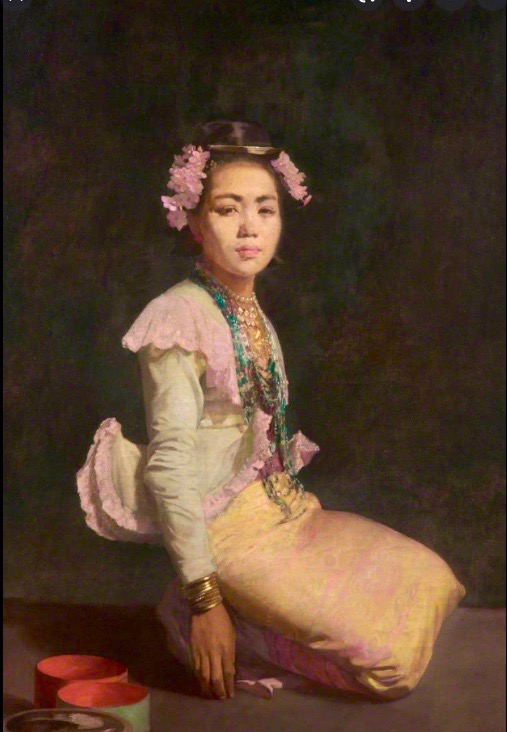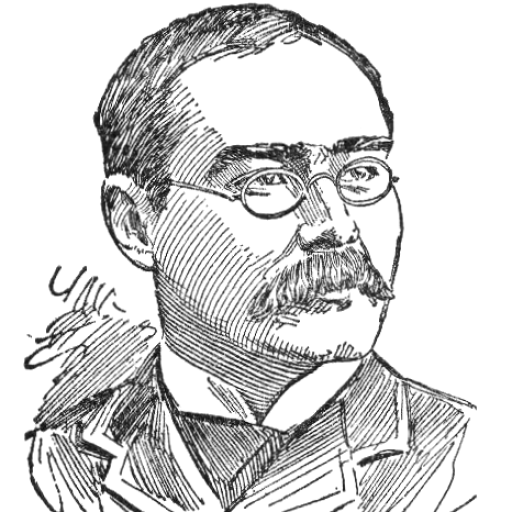I’ve a neater, sweeter maiden in a cleaner, greener land!

Many of those who have spent a long time in the Far East fall under its spell, and can never again be at peace anywhere else. Thus in Africa I met many Frenchmen who used to work in Indochina; they invariably longed to be back there. Though the climate and their work in Africa were similar, the ambience was not – they were subsisting, but not living.
If you live in a different culture and have a close relationship with a person brought up in that culture, it colors your whole experience; you get to see the culture through their eyes. Thus for the narrator of this poem, his Burmese girl became “the soul of all the East” and the focus of all his memories –
“… I’ve a neater, sweeter maiden in a cleaner, greener land!”
Kipling had a great reverence for Buddhism (his best-known novel ‘Kim’ is really a song of praise to Buddhism, in the person of the old lama – Kim’s mentor – who is depicted with so much love and respect; the poem ‘Buddha at Kamakura’ underscores this respect). But here it is not Kipling who talks but a British ex-soldier of limited education, who had no background for comprehending the feelings his girl has surely had for “the Great Gawd Budd”.
Mandalay is the spiritual and cultural center of Buddhism in Burma (Myanmar), with many Buddhist temples and over 700 pagodas – a fitting setting for this poem.
Mandalay
By the old Moulmein Pagoda, lookin' lazy at the sea,(1) There's a Burma girl a-settin', and I know she thinks o' me; For the wind is in the palm-trees, and the temple-bells they say: "Come you back, you British soldier; come you back to Mandalay!" Come you back to Mandalay, Where the old Flotilla lay: Can't you 'ear their paddles chunkin' from Rangoon to Mandalay? On the road to Mandalay, Where the flyin'-fishes play, An' the dawn comes up like thunder outer China 'crost the Bay! 'Er petticoat was yaller an' 'er little cap was green, An' 'er name was Supi-yaw-lat - jes' the same as Theebaw's Queen,(2) An' I seed her first a-smokin' of a whackin' white cheroot, An' a-wastin' Christian kisses on an 'eathen idol's foot: Bloomin' idol make o' mud - Wot they called the Great Gawd Budd - Plucky lot she cared for idols when I kissed 'er where she stud! On the road to Mandalay . . . When the mist was on the rice-fields an' the sun was droppin' slow, She'd git 'er little banjo an' she'd sing "Kulla-lo-lo!" With 'er arm upon my shoulder an' 'er cheek agin my cheek We useter watch the steamers an' the hathis pilin' teak. Elephints a-pilin' teak In the sludgy, squdgy creek, Where the silence 'ung that 'eavy you was 'arf afraid to speak! On the road to Mandalay . . . But that's all shove be’ind me - long ago an' fur away, An' there ain't no 'buses runnin' from the Bank to Mandalay; An' I'm learnin' 'ere in London what the ten-year soldier tells: "If you've 'eard the East a-callin', you won't never 'eed naught else." No! you won't 'eed nothin' else But them spicy garlic smells, An' the sunshine an' the palm-trees an' the tinkly temple-bells; On the road to Mandalay . . . I am sick o' wastin' leather on these gritty pavin'-stones, An' the blasted English drizzle wakes the fever in my bones; Tho' I walks with fifty 'ousemaids outer Chelsea to the Strand, An' they talks a lot o' lovin', but wot do they understand? Beefy face an' grubby 'and - Law! wot do they understand? I've a neater, sweeter maiden in a cleaner, greener land! On the road to Mandalay . . . Ship me somewheres east of Suez, where the best is like the worst, Where there aren't no Ten Commandments an' a man can raise a thirst; For the temple-bells are callin', an' it's there that I would be - By the old Moulmein Pagoda, looking lazy at the sea; On the road to Mandalay, Where the old Flotilla lay, With our sick beneath the awnings when we went to Mandalay! On the road to Mandalay, Where the flyin'-fishes play, An' the dawn comes up like thunder outer China 'crost the Bay!
Notes
[1] Moulmein, 110 miles east of Rangoon in the Burmese panhandle, is not on the road to Mandalay (which is up the Irrawaddy River some 530 miles from Rangoon) except in a poetic sense. However, it does have a huge white pagoda facing the sea, which Kipling felt to be vibrating with romance. After visiting it in 1889, he wrote: “I should better remember what the pagoda was like, had I not fallen deeply and irrevocably in love with a Burmese girl at the foot of the first flight of steps”.
[2] Theebaw was the last king of Burma (now Myanmar), ruling only Upper Burma until it too was annexed by the British in 1885. As a ruler he was much influenced by his wife Supayalat.
